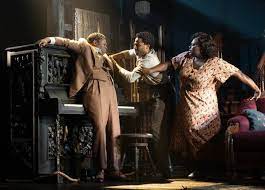
The Piano Lesson marks the halfway point of my journey through August Wilson’s Pittsburgh Cycle. He wrote ten plays chronicling the African American experience during each decade of the twentieth century. Each one of them thus far has been outstanding. This masterpiece won the Pulitzer Prize as did Fences.
The drama takes place in 1936. Doaker Charles (Samuel L. Jackson) lives in his home with his niece Berniece (Danielle Brooks) and her daughter Maretha (Jurnee Swan). Her brother Boy Willie (John David Washington) and his friend Lymon (Ray Fisher) arrive one day early in the morning from down south. They are sharecroppers who have a truckload of watermelon to sell.
The owner of the farm where they work is dead, having fallen down a well under mysterious circumstances. Boy Willie believes his future lies in buying that now available piece of land. His idea involves not only selling the produce but also the family heirloom. The piano was carved by an enslaved ancestor. The images include the faces of a great-grandfather’s wife and son during their enslavement.
Despite an emotionally troubled relationship with the piano, Berniece has no intention of letting it go. Preacher Avery (Trai Byers) once brought a buyer to the house but Berniece refused to sell. Boy Willie hatches a plan to have that buyer located. He owns half of that piano and wants to put his inheritance to use.
Wining Boy (Michael Potts) is the elder brother of Doaker Charles. A comical character, he fancies himself a successful musician and gambler. In actuality he is an alcoholic who often has little or no money. Each adult character has an opinion about this piano, some of which will evolve during the course of the story.
The play also touches on various themes related to present and past. Never forgetting one’s roots and also woefully looking backward versus living in the present with a keen eye on the future. That is not a generational tug-of-war but an individual one. Boy Willie most aggressively looks ahead while Wining Boy’s best days are memories which are long behind him.
As in the superb Joe Turner’s Come and Gone, supernatural elements figure into this drama. These people are haunted by their histories. The piano is a physical embodiment of that deeply felt connection. From the beginning of the play, however, a more ethereal presence is felt. A phantasmic mysteriousness hovers over these characters as well as over the audience.
Mr. Jackson’s wife, Latanya Richardson Jackson, directed this clearly staged and vividly told tale. Her husband, an enormous stage and screen star, originated the role of Boy Willie thirty five years ago at the Yale Repertory Theatre and understudied the role in its original Broadway outing. His performance here as the older Doaker is spot on with nary a moment of showboating star power ego.
This production’s Boy Willie, John David Washington, is the son of another A-list star, Denzel. I saw the father’s Tony winning performance in a 2010 Broadway revival of Fences. The son is exceptionally fine in this role as well. Boy Willie is a big character, a somewhat unlikable schemer who is filled to the brim with personality and drive.
Ms. Brooks’ Berniece is a complex combination of hard-earned strength and debilitating anxiety. Mr. Potts depiction of Wining Boy is an edgy, comical thrill. Everyone in the cast is excellent, including a spectacular cameo from April Matthis as Grace, a woman Boy Willie and Lymon meet on the town one night.
As Lymon, Ray Fisher delivered a phenomenally realized characterization which was deceptively simple. A quiet type, he experiences this family as we do. Everything about his performance was incredibly realistic with memorable physicality and an understated yet heartwarming sense of optimism. Maybe a new life can be had in the North.
All the technical elements of this staging are excellent. I did find the direction occasionally distracting when multiple monologues were performed dead center facing the audience rather than towards other members of the cast.
In addition to those plays already mentioned, I’ve also seen Ma Rainey’s Black Bottom and Jitney. Picking a favorite in this Cycle is impossible. If you haven’t seen any of Mr. Wilson’s work, The Piano Lesson is an awesome place to start. During a week of theater where I attended seven shows, this one was my absolute favorite.
